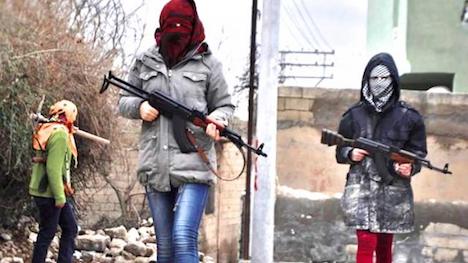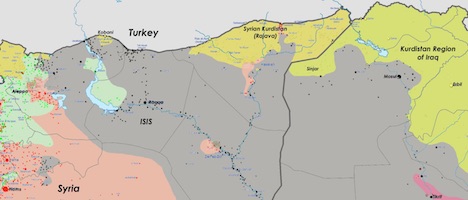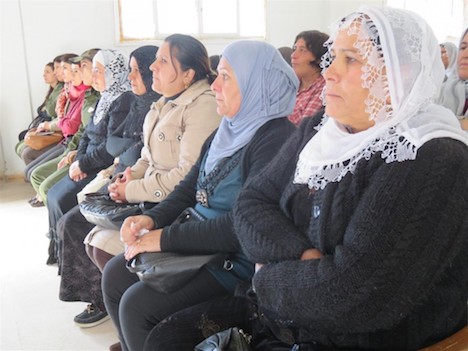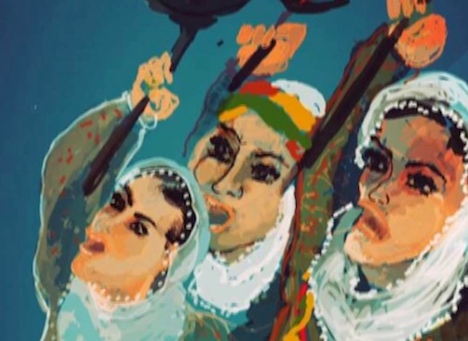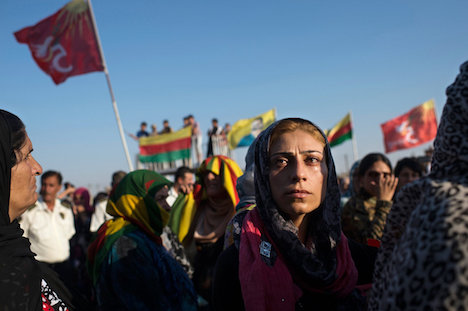This is the third in a four-part series looking at the radical social and economic changes transforming the Kurdish communities of Rojava, in northern Syria. Read the first and second parts here.
“Men who experience economic, political and sexual oppression soon learn to compensate for it psychologically by committing acts of violence on family members. Taking out one’s resentment on one’s family is less risky than challenging oppressors,” write Anja Flach, Ercan Ayboğa and Michel Knapp in their book Revolution in Rojava: Democratic Autonomy and Women's Liberation in Syrian Kurdistan, the first comprehensive account of the bottom-up revolution happening north of Syria. One of the revolution’s starting points, assert the authors, is that we live in a patriarchal world in which men violently dominate women. This means, quite simply, that there is no true democracy without smashing patriarchy.
Trump's Misogyny is Not Exceptional Donald Trump’s election success – despite what he has said and done towards women – indicates that there are a lot of men, and even women, across the U.S. who condone these attitudes and actions. Based on this, and the fact that no woman has ever held the nation's highest office, some argue the U.S. is exceptionally sexist. But this misses an underlying systemic problem. Obviously Trump has heinously oppressive views towards women, as well as deeply racist, homophobic and other appalling stances. But we should not underestimate the sexism inherent in the rest of capitalist system. Everywhere deserves critique. The U.K., for example, might be praised as a place where women’s equality is stronger than many other regions; after all, it currently has its second female leader in office, Theresa May. But despite this, British society is fundamentally sexist. Consider: in Britain each year, 3 million women experience violence from men, including rape, sexual assault, domestic violence and murder. Women are worst impacted by Britain’s austerity measures. In 2015, figures showed that of £26 billion in austerity cuts, £22 billion were taken directly from women. The same austerity policies reduce efforts to combat patriarchal violence, as the latest budget included further cuts to support for domestic violence survivors. One could even argue that Theresa May, as both Prime Minister and Home Secretary, has extended institutional sexism. For example, in her former role she was responsible for Immigration Removal Centres such as Yarl’s Wood, which has been criticized for systemic abuseagainst its women detainees. But we should not single out the sexism of Britain under May, either. The broader point is that women who do rise to political power often embrace and extend the patriarchal world. Not always, but often. It is worth considering the corporate media's treatment of May along with other female politicians. The prime minister has taken heavy criticism for her choice of trousers. An article in the Guardian epitomized the stereotype of female leaders by focusing on The Bob as the haircut of choice. (It is well documented that Margaret Thatcher went through speech coaching to deepen her voice after becoming prime minister; by contrast, male politicians have the privilege of not having to deal with gender assimilation or gender based critique.) This same point can be extended beyond politics to general relations between men and women. Patriarchy is not only about violence and threats. Men have the privilege of not being demeaned, belittled and mocked due to their gender. It continues to be a straight-white-rich-man’s world. If we look across the planet, the same kind of institutional sexism dominates. World Health Organization statistics show that one in three women face domestic and sexual violence. Women everywhere are disproportionately impacted by economic crisis and austerity. At the other end of the spectrum, most of the global 1% are men; of the 62 wealthiest people on earth, only nine are women. From an intersectional perspective, it is essential to also mention the list is predominantly white and they were mostly born into money.
Challenging Patriarchal Extremists The Rojava Revolution is not only about challenging traditional patriarchy. It is also a message of resistance against one of the most extreme anti-women forces in the world: ISIS. The jihadist-fascist group's severe abuses against women have been widely documented, including torture, rape and selling young girls into sex slavery. To survive against this attack, the Kurdish Rojava region of northern Syria defends itself with the use of mixed and women only fighting units. Women’s leading role in the fight is essential, the authors write, for at least three reasons: 1) Without defense there would be no space for any revolution; 2) The women, by taking what are traditionally considered men’s roles, challenge the patriarchy of both their traditional society and ISIS; and 3) A core focus of the defense unit is devoted to education and workshops, including the teaching of Jineolojî, which translates as women’s science. This education system is geared toward rethinking society and knowledge critically in order to challenge imperialism, elitism and male domination. As a social science, Jineolojî seeks to include women in history, recognize women’s input politically and empower women in society.
A Revolution For Women By Women Women are, in fact, central throughout Rojava’s new society: through the concept of Dual Leadership; in the bottom-up council democracy system where every meeting must have a 40 percent women's quorum to make decisions; and in every council, which must have one man and one woman co-chair. There are also women-only security Asayîş Jin (bottom-up police) to deal with domestic violence and other crimes against women. Every town or city has a women’s house, a place that can serve as a sanctuary or place of education. Called Mala Jinan, these centers are organized by the Kongreya Star (previously Yekîtiya Star). Formed in 2005, the Kongreya Star plays a pivotal role in Rojava. A confederation of women’s movements, Kongreya Star focuses on education, economics, media, ecology, international relations and justice. One example of how the organizations are changing local economics is the establishment of women’s cooperatives, which represent a broader shift towards a bottom-up economy serving people, not profits. This statement from the Kongreya Star explains the mission well: “Only when women are able to organize themselves, we believe, will they be able to challenge the current patriarchal structures and mentalities in order to build viable, sustainable alternatives. Without the liberation of women, a truly free society is impossible.”
Source URL |
